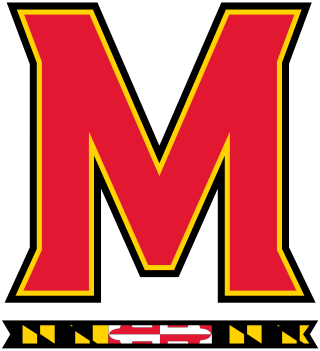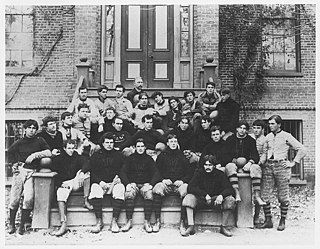Related Research Articles

The Virginia Cavaliers football team represents the University of Virginia (UVA) in the sport of American football. Established in 1887, Virginia plays its home games at Scott Stadium, capacity 61,500, featured directly on its campus near the Academical Village. UVA played an outsized role in the shaping of the modern game's ethics and eligibility rules, as well as its safety rules after a Georgia fullback died fighting the tide of a lopsided Virginia victory in 1897.

Sylvanus Blanchard "Samuel" Newton was an American college football player and coach. He served as the head football coach at Pennsylvania State University (1896–1898), Lafayette College, Lehigh University (1902–1905), and Williams College, compiling a career coaching record of 83–58–5.

The Johns Hopkins Blue Jays are the 24 intercollegiate athletic teams that represent Johns Hopkins University, located in Baltimore, Maryland. They compete in the NCAA Division III, except for their lacrosse teams, which compete in Division I. They are primarily members of the Centennial Conference, while the men's and women's lacrosse teams compete in the Big Ten Conference. The team colors are Hopkins blue and black, and the blue jay is their mascot. Homewood Field is the home stadium.
Arthur Burnham Woodford was an American economist, university professor, college football coach, and grammar school rector. He was the first head coach of the Indiana Hoosiers football team, holding that position from 1887 to 1888.

John Abner Penton was an American football player and coach. Penton attended the University of Virginia, Auburn University, and Johns Hopkins Medical School. He played starting guard on the 1893, 1894, and 1895 Virginia football teams and was captain of the 1893, 1894, and 1895 teams. After he graduated from the University of Virginia, Penton chose to play as a "special student" fullback on the Auburn football team under head coach, his long-time companion, John Heisman in 1897. The first coach at Clemson, Walter Riggs, had in fact played on the team as well. Penton had lived near the Auburn campus his entire life and likely facilitated the Pennsylvania native, Heisman's, move to the campus. Penton then served as the third head football coach at Clemson University for one season in 1898, compiling a record of 3–1 before the program ran out of money.

Benjamin Russell Murphy was an American athlete, coach, and athletics administrator during the early 20th century. A graduate of the University of Pennsylvania, he coached at numerous schools in several sports including football, basketball and track. Murphy was the first basketball coach at Johns Hopkins University. He is also one of the few college football coaches to resign during the middle of his first year of coaching at a school.

Richard "Bill" Armstrong was an American college football player and coach. He served as the head football coach at the College of William & Mary in 1896, the United States Naval Academy from 1897 to 1899 and the Hampton Institute—now known as Hampton University—in 1912, compiling a career college football coaching record of 24–8. At the Naval Academy, Armstrong also coached rowing from 1897 to 1899.

The Maryland Terrapins men's lacrosse team represents the University of Maryland in National Collegiate Athletic Association (NCAA) Division I lacrosse as a member of the Big Ten Conference. Maryland was a founding member of the Atlantic Coast Conference before withdrawing after the 2014 season.
The Johns Hopkins–Maryland lacrosse rivalry is an intercollegiate rivalry between the Johns Hopkins Blue Jays, which represent Johns Hopkins University, and the Maryland Terrapins, which represent the University of Maryland. The most prominent event has been the men's lacrosse series, which is widely regarded as one of the greatest rivalries in the sport. More than 115 contests in the series have been played since the schools first met in 1895. The competition is intensified by each program's status as a traditional lacrosse powerhouse. As such, the game has often held national championship implications, and twice the teams played to represent the United States in the Olympics.
Michael A. Burlingame is an American historian noted for his works on Abraham Lincoln. He is the Naomi B. Lynn Distinguished Chair in Lincoln Studies at the University of Illinois Springfield. Burlingame has written or edited twenty books about Lincoln.
Edwin Hanson Webster "Jigger" Harlan was an American college football and college baseball player and coach, and attorney. He played football at Princeton University and was a consensus first-team selection to the 1907 College Football All-America Team. Harlan coached the Johns Hopkins University football and baseball teams in 1912. He served as the head football coach at Texas A&M University from 1915 to 1916.
The 1895 College Football All-Southern Team consists of American football players selected to the College Football All-Southern Teams selected by various organizations in 1895. North Carolina running back George Stephens caught the first forward pass in the history of the sport.
John Saunders Taylor was an American college football player and coach as well as an attorney.

The 1896 VPI football team represented Virginia Agricultural and Mechanical College and Polytechnic Institute in the 1896 college football season. The team was led by their head coach Arlie C. Jones and finished with a record of five wins, two losses, and one tie (5–2–1).
The 1913 Maryland Aggies football team was an American football team that represented the Maryland Agricultural College as an independent during the 1913 college football season. In their third season under head coach Curley Byrd, the Aggies compiled a 6–3 record, shut out five of nine opponents, and outscored all opponents by a total of 184 to 139. The team's three losses were to Navy (0–76), Gallaudet (0–26), and Pennsylvania Military (7–27).

The 1912 Maryland Aggies football team was an American football team that represented Maryland Agricultural College as an independent during the 1912 college football season. In their second season under head coach Curley Byrd, the Aggies compiled a 6–1–1 record and outscored all opponents by a total of 191 to 60.
Wilson Lloyd Fewster was an American college lacrosse player and college football, college lacrosse, college soccer, and wrestling coach. He coached all four of those sports at various times between 1951 and 1966 at his alma mater, Johns Hopkins University in Baltimore, Maryland. Fewster also served as the head lacrosse coach at Washington & Lee University in 1951 and the University of Virginia in 1954.

The Johns Hopkins–Virginia lacrosse rivalry is an intercollegiate lacrosse rivalry between the Johns Hopkins Blue Jays and Virginia Cavaliers. The teams compete for the Doyle Smith Cup, which was first awarded in 2006. Edward Doyle Smith Jr., the only inductee to the U.S. Lacrosse Hall of Fame to have never competed in the sport, was a team manager and statistician at Johns Hopkins for five years before becoming UVA's first assistant sports information director, which he held for 31 seasons. Smith is also credited with the standardization of game statistics for lacrosse at the national level, twice receiving the USILA Man of the Year Award.
References
- ↑ "The Great Game To-Day". The Times. November 29, 1894. p. 2.
- ↑ "[No title]". The Daily Tar Heel. April 18, 1896. p. 4. Retrieved March 14, 2015– via Newspapers.com.

- ↑ Hullabaloo. Press of Guggenheimer, Weil and Co. 1896. p. 165.
- ↑ "Johns Hopkins University Football Record Book" (PDF). Archived from the original (PDF) on December 27, 2015. Retrieved April 15, 2015.